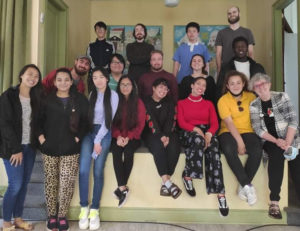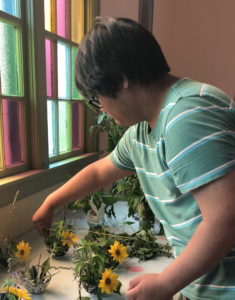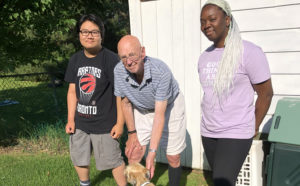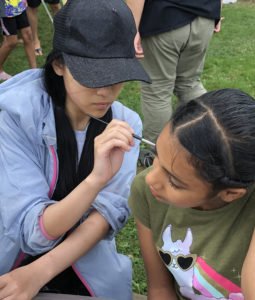Youth in Charlottetown reflect on serving full-time during the summer months
The summer of service program in Charlottetown, P.E.I. was designed by tutors, coordinators, and cluster agencies as a formal space for youth to offer full-time service in the summer months. Tiancheng Zeng (Tian), Go Kitakawa and Jasmine Meng are three youth that joined the program. The following stories share their experiences with the program as well as their reasons for joining. They hope that their stories will be helpful for other youth who are considering offering a period of full-time service to their communities.
Tiancheng Zeng (far right) paints a birdhouse during a service project last summer.
When Tian was a junior youth, he initially only attended the meetings of the junior youth group because his best friend attended regularly. Tian himself felt there was too much study time. One service project, however, significantly changed Tian’s opinion of the junior youth program.
Tian’s junior youth group held meetings at a retirement home, and sometimes the junior youth visited and conversed with the seniors. Tian remembers this experience fondly, saying, “At that time my English was bad, and I didn’t have a lot of chances to talk in English with other people. So, when I conversed with the seniors and made them laugh, I felt very happy.” Because of this experience, Tian began to think of the junior youth group as a safe space to practice speaking in English with others. “I don’t remember learning much English from school, I don’t remember the vocabulary they tried to teach us there,” says Tian, “I think talking to others is the best way to improve.”

Tiancheng Zeng (Top left), Go Kitakawa (second row, second from the left), and Jasmine Meng (bottom row, third from the left) with their summer of service team.
Because of this experience, Tian gradually saw more benefits from the junior youth group, “I realized that I didn’t need to stay at home all day to play video games, and that they are not good for me, but this place is good for me.”
Tian is now 16 years old, and this past summer one of his friends told him about an opportunity to offer a period of full-time service in his neighbourhood. “I didn’t have a job or other commitments this summer, so I came here,” he explains. His primary reason for offering service, however, is to help the younger generation. “When I was a junior youth, the animators helped me with English, my other studies, and with life in general. Now, as an animator, I can take on their role and return what I received from my animators back to the junior youth in my neighbourhood,” says Tian.
To young people thinking about offering a period of service in the summer months, Tian says, “If you are a person that has nothing to do at home, and you want to develop yourself and make friends, the junior youth group is the best place for you to come. No one wants to stay at home and play video games all day – your mom and dad will not be happy with that. Our group is welcome to everyone.”
For Go Kitakawa, offering a summer of full-time service was a natural next step in his path of service. He entered the community building process as a participant in a children’s classes in Charlottetown, and now at age 16, he feels ready to give back to the next generation of children in his community. But Go also recognizes that his training and service had an effect on his own development.
“Because the summer program was so intense, it showed me that I could become much better than I was before. It helped me look at myself more. Before the summer program, I had never thought about developing spiritually.”
Go feels his service as an animator, which began in the summer, is a major factor in his spiritual development. He reflects on this service, saying, “Sometimes it is tiring, and it also isn’t as easy as it looked to me before starting. At the same time, even when it is physically and mentally tiring, emotionally I always feel great. It is one of the few things I’ve felt I want to continue for a very long time.”
The summer’s service has also taught Go communication skills. “The level of conversations we have during home visits is very high,” he says, “The people we visit are usually very spiritually developed and they have much to offer, so I learn a lot from listening.”
While he learned a lot this summer, one question remains. He wonders why the learning environment of the summer of service program is so different from the learning environment he experiences at school. “Maybe it’s having a common goal,” says Go, “Everybody here came to develop themselves and become animators, they came with the idea of excellence. Whereas in school, most people attend because they have to be there. The level of dedication is different.” Go feels that the spirit of joy and friendship is another factor that attracts people to the space. “Everybody enjoys being here. That is why the atmosphere feels joyful,” he says, “I became friends with the people in my summer of service program in less than a week, but in school, even after months, it is hard to open up to people.”
Unlike Tian and Go, Jasmine Meng was introduced to the institute process recently. She learned about the summer of service program during a presentation at her high school. Jasmine was searching for something meaningful to do during her summer break and the opportunity to serve her community drew her attention. When she listened to the presentation, she felt it was the right way to spend her summer. “I think my only motivation for joining the program was that I wanted to help people,” says Jasmine.
At first, it was difficult for Jasmine to interact with new people. “I was a little afraid to do these things because I am not a social person,” shares Jasmine. “So, I just listened and the first few days, I was quiet. Then I realized everyone around me was nice, willing to help, caring and loving. So, I felt that I should become more open with people. After that, I did better and better, especially during home visits.”
Jasmine made many friends during the two months of the summer service program. The youth spent their time studying together and meeting new people in their community. Describing their day-to-day activities, Jasmine says, “The lessons in the mornings were about how we can interact with different people in society, and we also learned about spiritual qualities from our Ruhi books.” In the afternoons, the teams would visit families and children; the team also organized junior youth camps, she said. The experience made Jasmine feel that serving her community through the program was the right thing to do. Sharing her thoughts about the program overall, Jasmine says, “I liked it, so now I continue to volunteer. If I have the chance, I’ll do this again next summer.”
Jasmine Meng (top far left) participates in a skit with fellow summer of service friends while Go Kitakawa watches the performance (bottom left).










